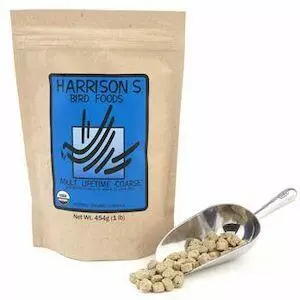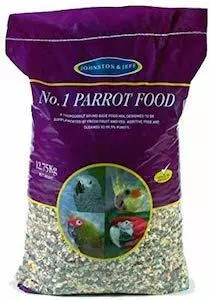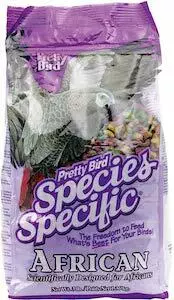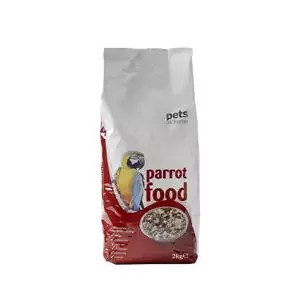Types Of Parrot Food
Aside from the fresh stuff such as fruit and vegetables, shop-bought parrot food comes in two variations – pellet and seed mix.
Pellets are preferred as the main diet source, approximately 40-80% depending on breed and size, as they contain the nutrients needed for good health, with the rest made up of mostly vegetables and a small amount of seed.
Pellets
Pellets have been around as a complete food for most indoor birds for over 30 years now.
The ones on sale now are much-improved on what was available years ago, as the understanding of a parrot’s diet has improved.
They’re often described as a maintenance diet product as they contain most of the vitamins, probiotics, calcium and other minerals needed daily, so a good portion of pellets every day will cut out the need for further supplements.
Pellets are available for all bird species. If you buy high-quality pellets, they shouldn’t contain too many artificial additives. But as they aren’t the most natural food for indoor birds, some may not take to them, and it could be easier to wean a young bird onto pellets rather than switching diets.
Seed Mix
Seed mixes aren’t a complete diet for parrots, even though they seem like the more natural pick between these and pellets. Most vets recommend the latter as most of the diet, with a scattering of seeds daily.
If you choose to give your bird more seed and cut down on pellets, you will likely need to feed your bird additional supplements such as vitamins and calcium. They can also get these from greens, but you’d have to monitor the right balance.
Watch out for the content of sunflower seeds. Too many fed to a parrot can be fatal, by clogging their arteries. Around a dozen per day is fine, but this means you don’t want to buy a cheap seed mix which has been bulked up with sunflower seeds.
Some seed mixes now contain pellets too, making them an almost exclusive diet for your bird (but watch out for exact content and advice from brand to brand).
Pellet/Seed Size
Parrots can eat larger pieces of food compared to smaller birds, but according to the Circus Diet study from Parrot University, pea-sized pieces are best as your bird’s brain is automatically focused on eating every item without thinking too much about how to do this.
This mostly applies to home-prepared food as most commercial is generally fine, but if you are concerned your parrot is not eating properly or is fussy, looking for pellets or seeds which are smaller is a great idea.
Bear in mind that some larger birds, particularly parrots, can ignore seeds which are too small if this is what they are given. It may take a while to find the right balance.
Organic Ingredients
Many parrot foods will use human-grade food, which shows the best quality and usually cuts out the additional additives, preservatives and colourings. This is the best for your bird.
When looking for fresh food, you should also opt for organic where possible. Organic foods may have higher nutritional value versus ordinary, according to some research. This is because no pesticides and fertilisers mean a boost of vitamins and antioxidants.
Selective Feeding
Birds, just like other small animals, can often pick out their favourite parts of food mixes and leave the rest, leaving them suffering from malnutrition.
This is why, when buying pellets, purchasing a mix where all of the pellets are the same is a good idea. You can choose for them all to be the same colour or a mixture, but it is a good idea to avoid muesli mixes with pieces of dried fruit flakes or seeds in if your bird is fussy.











